Developer: BeLight Software
Official web page: Rails
| Nick Shubin | ||||
| Home | Articles | Photos | Publications | Site Map |
Nick Shubin
May 28, 2013 (Last updated: December 23, 2013)
![]()
Developer: BeLight Software
Official web page: Rails
Traffic control elements are switches and traffic lights. The program adds them automatically depending on the configuration of your tracks. To change the state of a traffic light or switch, you need to tap on it.
The smallest part of track you can add is a railway segment that can be straight or curved. In the picture below, circles define the segment ends. Traffic control elements can appear only at segment ends.
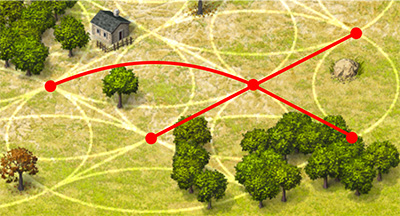
Traffic lights appear at the ends of curved tracks.
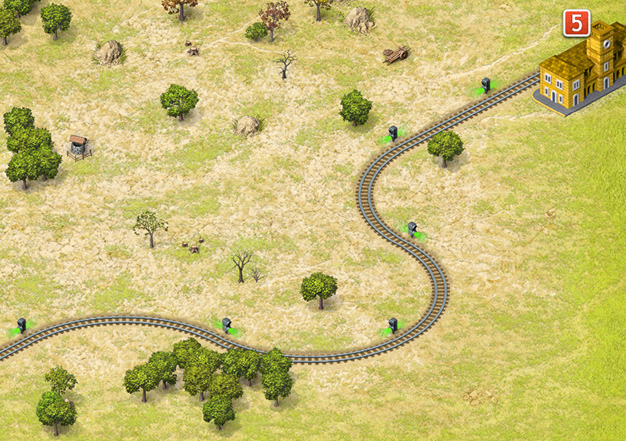
There is no traffic lights on a straight railway. Thus, you cannot stop or reverse a train there. For an exception, a traffic light is always added at the end of the station exit.
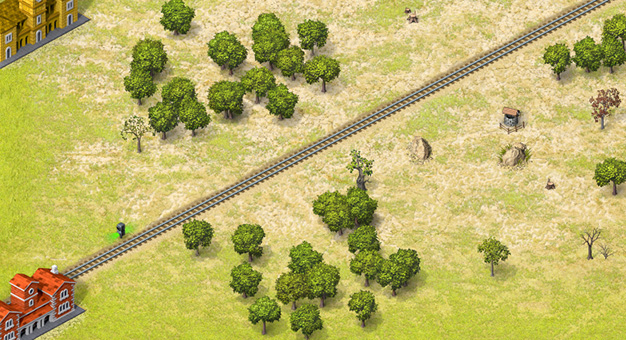
Avoid building too long straight tracks. If you have one, crate a branch to manage trains using a switch.
Switches appear where rails branch off (see 2. Adding Tracks).
A switch would replace a traffic light if a new track begins or ends in that point.
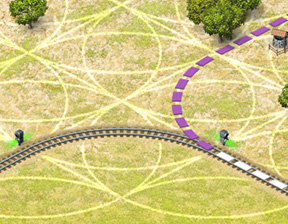
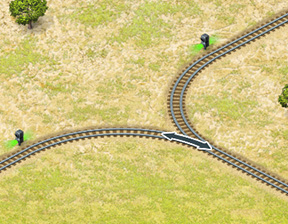
A traffic light can also disappear in the point where one track crosses another without any switch.
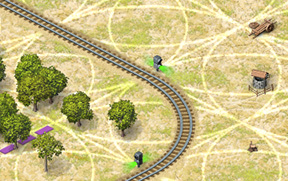
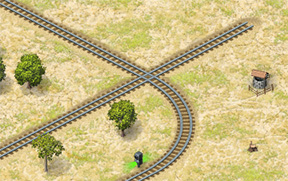
You can switch traffic lights at any time. But you need to do this before an approaching train reaches it. The train will continue moving if you turn on red light when a locomotive already has passed the traffic light. You can change the state of a switch only when there is no any train on it.
Be ready to plan your railway network from the very beginning of each level. As a rule, first several tracks define the configuration of future paths between the stations.
A straight track across the whole map may look optimal when you connect only two stations. Later, when all the stations have shown up, you may prefer it pass in a different way.
Let's look at several examples. How do you find this railway?
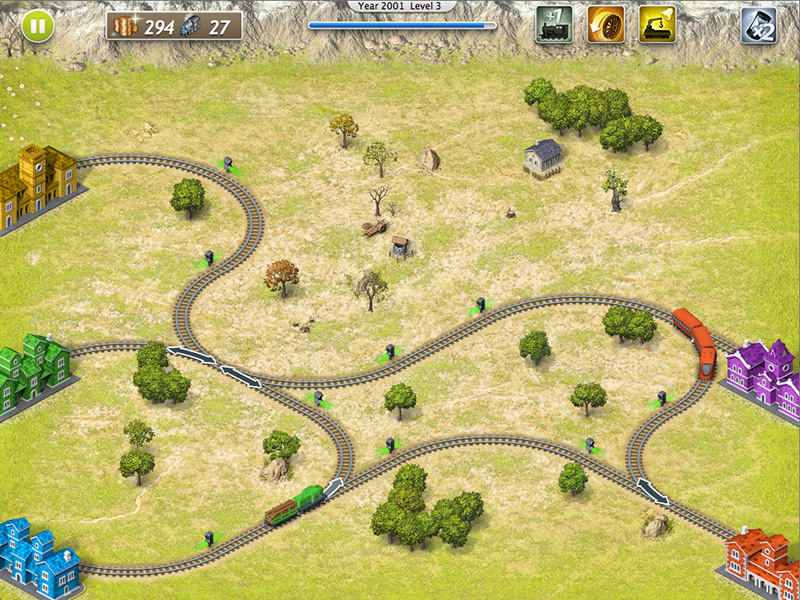
It looks very simple and consequently it is easy to control. Right, it is. But it's Level 3 with no special trains. The traffic is not intensive. The railway layout in this example has almost all major disadvantages:
The only good thing to say about this railroad–we have made almost no damage to the beautiful countryside landscape. I'm kidding.
Here is another bad example with identical disadvantages.
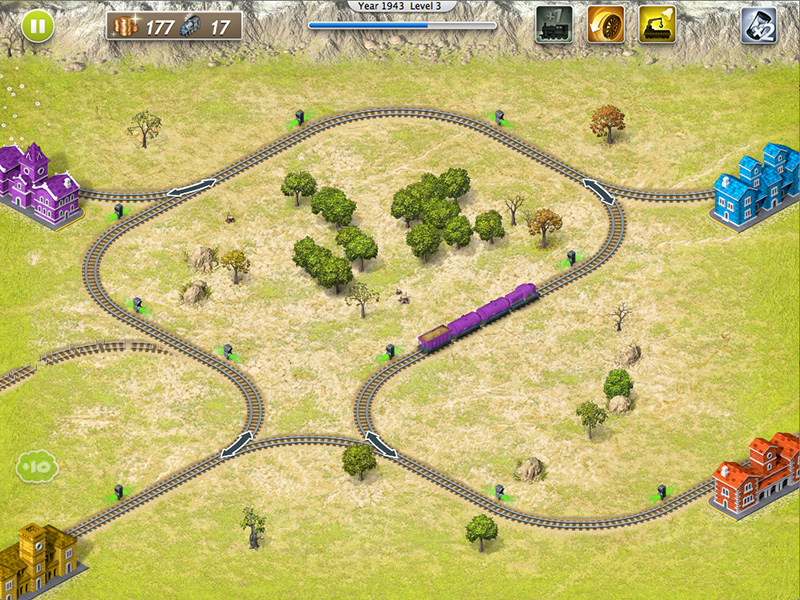
Below there are more or less good examples.
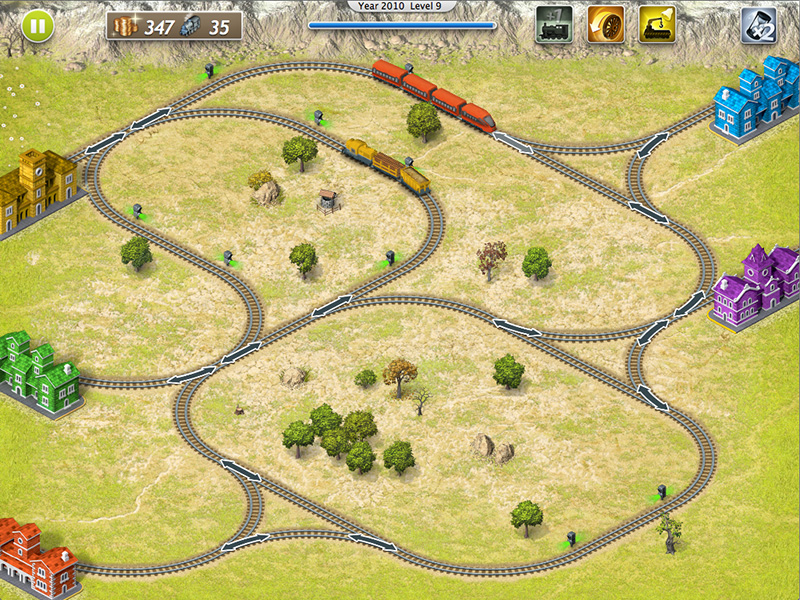
Near each station, there is a switch.
Sometimes it is helpful to have one or more large circles.
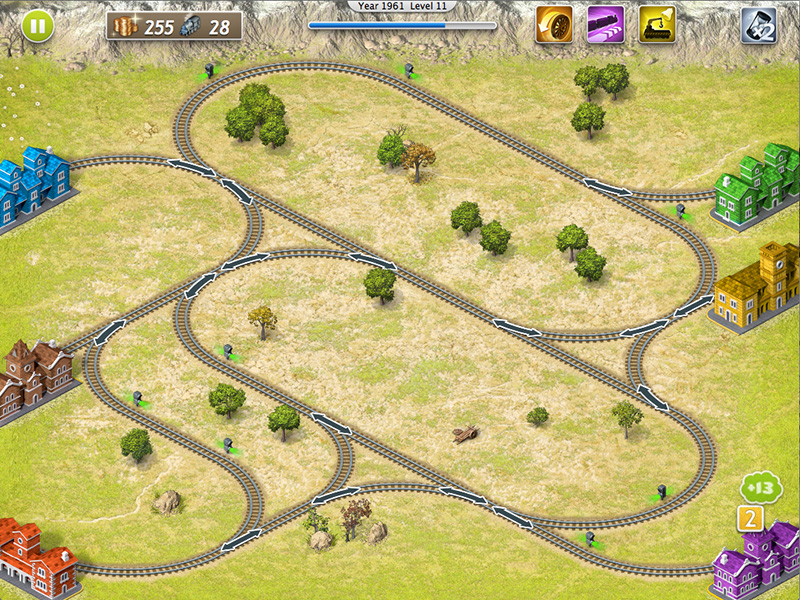
Of course, you may have secondary goals that influence the structure of your railway. For instance, to get an achievement for removing all trees, you have to add extra unnecessary tracks making managing your railway more complicated.
The bonus icons are shown above the map to the right. There are always three of them available. Each level offers you a certain combination of bonuses that meets the train types on this level.
The use a bonus, tap on it to activate, and then tap on some object to apply. Each bonus can be applied to a specific type of object only.
The icon of an activated bonus is slightly dimmed. In this state you can apply it or deactivate it by tapping on its icon again. Also, you can deactivate one bonus by tapping on another.
After applying, bonuses need some time to refresh. The icon gives you an idea about the state of the bonus.
Ready to use:
![]()
Activated:
![]()
Recently applied:
![]()
Refreshing:
![]()
Boost

This bonus dramatically speeds up trains that are moving either forwards or backwards. Before applying, make sure that the way before the train is free especially when you are playing at 2x speed. In the beginning and middle of a level, use this bonus as frequently as possible to delivery as many trains as you can. Boost can help you avoid collisions when two trains are going to reach some point in the same time. Just accelerate one. In the very end of a level, when a train is lacking several more seconds to reach a station, boost it to earn some more money. It's the most favorite bonus for the author.
To apply this bonus, activate it and then tap on a train.
Reverse

This bonus immediately reverses a train. It is useful to avoid collisions. Also it is more effective when you need to reverse a Handcar or Snake Train because using a switch or traffic light may take much more time in certain situations. Don't forget that Crazy Trains cannot be reversed by any means including this bonus.
To apply this bonus, activate it and then tap on a train.
Add

This bonus lets you call an extra train. Use this bonus in the beginning of a level as frequently as possible to manage more trains. Be careful with this bonus if you already have intensive traffic on the map.
It is important to choose a proper station to apply. The author prefers this tactic. When there are only two stations on the map, and there is no any train, choose any station to call a new train. If from one of them a train has departed (or is about to depart), choose this station for an out-of-schedule train. This way, both trains will move to the same station using the same track, and won't interfere with each other.
With several stations in the game, choose one that has perfect railway connections to most of others. Or, on a level with Crazy Trains, choose a station that is very close to another making journeys of Crazy Trains as short as possible.
To avoid collisions, don't call a new train from any station if another train is arriving to it.
This is the second favorite author's bonus in Rails.
To apply this bonus, activate it and then tap on a station.
Service Train

This bonus is used to call a Service Train in order to clean rails from the wreckage.
To apply this bonus, activate it and then tap on a station.
Cleanup

The Cleanup bonus lets you remove debris from a track. The use of this bonus is much simpler than calling a Service train. You just need to tap on the wreckage to remove it.
Remove

The Remove bonus is you savior. When two trains are going to bump into each other, remove one of them from the map. Even in this difficult situation, keep thinking about your profit. If one of trains is almost reached its destination station, keep it in the game (remove another train). If both trains are far away from the destination, remove the most annoying train (definitely a Handcar or Kamikaze), or one that is more difficult to deal with (Snake, or Crazy, or two-colored Partner Train), or the cheapest one (which has less cars, or Deflation or Inflation Train with a lower sum of money).
To apply this bonus, activate it and then tap on a train.
Gathering all these shiny medals can become your new obsession. This is the second goal in the game apart from gaining as many coins as possible.
Usually, you are getting an achievement as a bonus to good results. This means you don't need to do anything particular but play as effective as you can.
Nevertheless, some achievements are incompatible with high scores, for instance, "Complete any label with less than 5 coins". Here you need to keep the score high enough to not to lose till the end of the level. Then crash several trains to decrease the some of money you have. To control your score more precisely and fast, draw extra rails.
Another example is "Remove all trees". This task is a bit tricky. In fact, you need to remove all objects from the map including plants, house, and even a bull scull. This can be done by adding rails. Sure the resulting railway will be far from perfect. You will need to pass some level twice: to have a good score and to get this achievement.
For the "60 Trains Gathered" achievement, you need to choose a level with only fast trains and without those that require too much of your attention. This level must provide the Boost and Add bonuses. Also trains should depart frequently enough because the Add bonus is not always available. The levels 20 and 52 match these criteria. Level 52 can be preferred because there are only Bumper trains which don't crash in case of collision.
For "20 crashed trains", you need to cope with two tasks in parallel: crash as many trains as possible, and survive till the end of the level with positive money balance. If it is near zero, it's OK. Don't forget that about a half of trains must reach stations to provide you with a stable income. This can be achieved on an easy level with the +1 and Boost bonuses. These are levels 16, 1 and 6. Also, check the results of the levels you played. Those that have greater scores are good candidates as well.
It is a good idea to replay some levels in order to gain missing achievements. Obviously, it is better to return to simplest levels, or to those that offer particular types of trains. To help you choose a level to replay, the following chapter lists trains present on each level.
© 2016 Nick Shubin. All rights reserved.